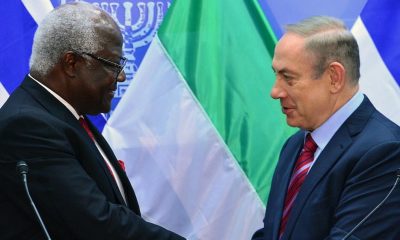
Israel

Netanyahu in crosshairs of Qatargate scandal
Israeli Prime Minister Benjamin Netanyahu has an uncanny ability to cling to power. From corruption trials to public protests, the man often dubbed “King Bibi” seems to always come out on top. Yet, a new scandal, ominously termed “Qatargate”, threatens to unravel his carefully crafted image and potentially his political career.
What began as whispers of illicit ties between Netanyahu’s inner circle and Qatar has erupted into a full-blown investigation, with rumours swirling that the prime minister himself may be personally involved. The affair raises profound questions about trust, accountability, and the future of a nation at war.
Qatargate first emerged in late 2024, when reports started circling that senior aides to Netanyahu had accepted money from Qatar, a key financial backer of Hamas and a mediator in ceasefire negotiations.
The accusations centred on two of Netanyahu’s closest confidants: Jonatan Urich, a longtime media advisor, and Eli Feldstein, a former military spokesperson. Both were arrested in March on suspicion of bribery, money laundering, and contact with a foreign agent. The Shin Bet, Israel’s internal security agency, alongside the police, launched a probe into claims that these aides were paid to promote Qatar’s image in Israel, allegedly at the expense of Egypt, another critical mediator in the Gaza conflict.
Like Watergate, Qatargate, has the potential to shake the foundations of the Israeli government. But what sets this affair apart is its timing: Israel remains embroiled in a war with Hamas, and Qatar’s role as a negotiator for hostage releases has placed it under intense scrutiny.
For many Israelis, the idea that aides to the prime minister might have been on Qatar’s payroll while the nation mourned the losses of 7 October, is nothing short of betrayal.
It’s important to note that Netanyahu hasn’t yet been named a suspect, but rumours of his personal involvement have fuelled the fire.
In December 2023, the Middle East Media Research Institute published leaked documents claiming that Qatar had transferred millions of dollars to Netanyahu himself between 2012 and 2018, ostensibly to support his election campaigns. These allegations, though unproven, gained traction early this year when former Israeli Defense Minister Moshe Ya’alon claimed that intelligence from the United Arab Emirates corroborated the transfers – $15 million in 2012 and $50 million in 2018.
Netanyahu has vehemently denied these accusations, filing a lawsuit against Ya’alon and dismissing the probe as a “political witch hunt” orchestrated by a “leftist deep state”.
The prime minister’s defenders argue that no concrete evidence ties him directly to the payments received by Urich and Feldstein. Netanyahu himself has stated that he cleared his schedule to provide testimony to police on 31 March only to meet investigators with “nothing to show”. Yet, the proximity of these aides to Netanyahu – Urich has been a fixture in his media team for a decade, and Feldstein served in the prime minister’s office during the Gaza war – raises uncomfortable questions.
Could Netanyahu have been unaware of such dealings within his inner circle? And if so, what else could be happening under his nose of which he’s unaware? Or, as some speculate, did he tacitly approve a strategy to leverage Qatari influence for political gain?
Adding fuel to the rumours is Netanyahu’s own history with Qatar. For years, his government facilitated the transfer of Qatari funds to Gaza, a policy critics say emboldened Hamas ahead of the 7 October attack.
Opposition figures like Yair Lapid have seized on this, arguing that Qatargate is the logical extension of a flawed approach, one that may have enriched Netanyahu’s allies while compromising national security. “The reason Likud doesn’t deny that people in Netanyahu’s office received money from Qatar,” Lapid declared in the Knesset, “is because they did.”
If proven true, the implications of Netanyahu’s personal involvement in Qatargate would be seismic.
Legally, it could escalate his existing corruption trial, where he already faces charges of bribery, fraud, and breach of trust. Politically, it risks alienating even his staunchest supporters. However, the Likud party has rallied behind him, framing the arrests as a “coup d’état” by the Shin Bet and Attorney General Gali Baharav-Miara. But cracks are appearing. Reports of a backlash within Likud over Netanyahu’s aborted attempt to appoint a new Shin Bet chief suggest that his grip on the party may be weakening.
For Israel’s international standing, Qatargate could strain relations with key allies. Egypt, already wary of Qatar’s regional ambitions, has expressed outrage over allegations that Netanyahu’s aides sought to undermine its mediation role.
The United States, a vital partner to Israel, may also view Qatar’s alleged penetration of Israel’s government with alarm, given Doha’s delicate balancing act as an American ally and Hamas patron.
Historically, Netanyahu has thrived on chaos, turning scandals to his advantage. Yet, this time it feels different. The anger over 7 October, coupled with the war’s ongoing toll, has eroded public patience.
Should evidence emerge linking Netanyahu directly to Qatari funds, he might be forced to resign – not out of principle, but survival. Even without proof, the scandal’s fallout may distract him from his war leadership and hostage negotiations.
Netanyahu’s legacy hangs in the balance. Will Qatargate be the scandal that finally topples “King Bibi”? The whole sorry affair is a sobering reminder of Israel’s vulnerability, not just to external threats, but to possible internal rot.
- Paula Slier is the founder and chief executive of Newshound Media International, and hosts the afternoon Home Run on ChaiFM.










